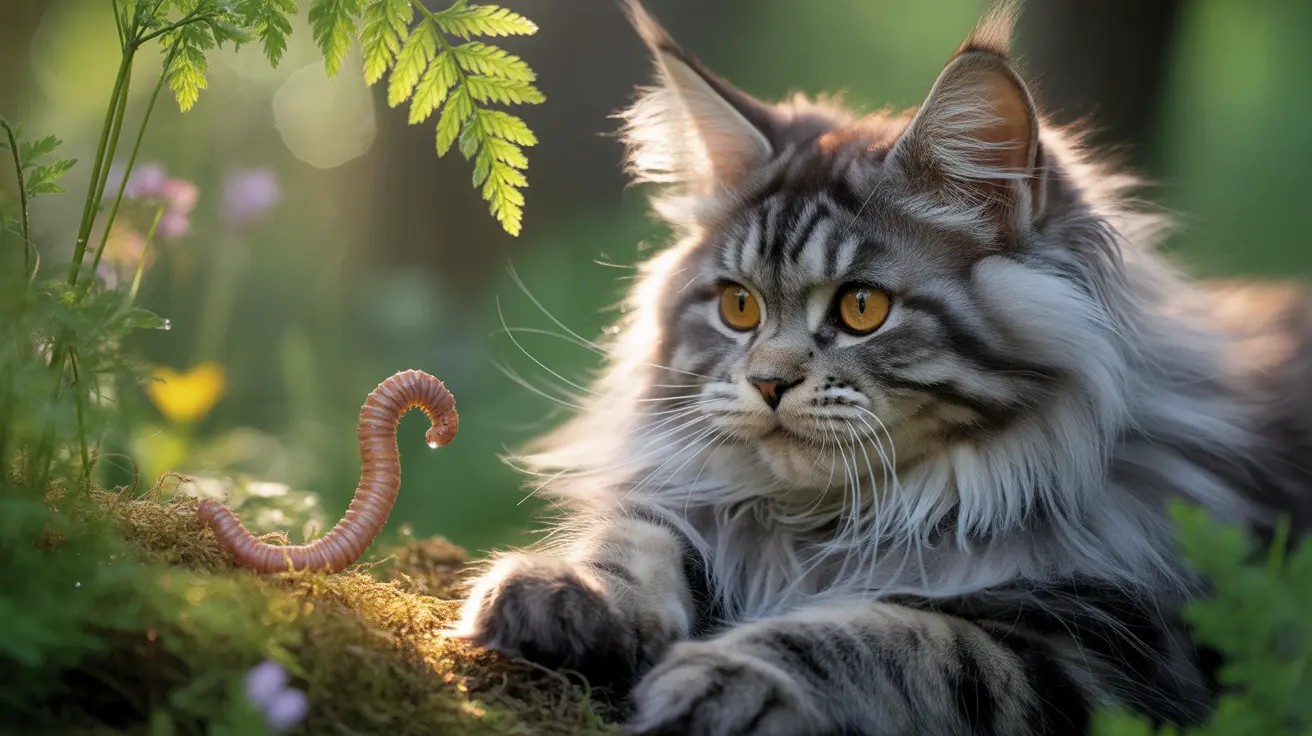Many cat owners have witnessed their feline friends hunting and potentially consuming various creatures, including worms. This common behavior raises important questions about safety and health risks. While cats' natural hunting instincts may lead them to catch and eat worms, understanding the implications of this behavior is crucial for responsible pet care.
In this comprehensive guide, we'll explore whether cats can safely eat worms, examine the potential risks and benefits, and provide clear guidance for pet owners facing this situation.
Types of Worms Cats Might Encounter
Cats typically encounter two main categories of worms: wild invertebrates like earthworms and commercially produced options like mealworms. Each category carries different implications for feline health:
Wild Earthworms
While not inherently toxic, wild earthworms can harbor numerous parasites and bacteria that pose significant health risks to cats. These creatures often act as intermediate hosts for various dangerous parasites.
Commercial Mealworms
Properly sourced and prepared mealworms can actually serve as nutritious treats for cats, offering high protein content and essential nutrients when processed according to safety standards.
Health Risks Associated with Worm Consumption
When cats consume wild worms, they face several potential health risks:
- Parasitic infections (including roundworms, tapeworms, and Capillaria)
- Bacterial infections
- Gastrointestinal upset
- Urinary tract complications
These risks are particularly pronounced with wild-caught worms, which may carry multiple forms of parasites and pathogens.
Safe Alternatives and Prevention
To protect your cat while satisfying their natural hunting instincts, consider these alternatives:
- Commercial cat treats designed to mimic prey
- Supervised outdoor time in enclosed spaces
- Interactive toys that simulate hunting behavior
- Regular preventive veterinary care, including deworming
When to Seek Veterinary Care
Monitor your cat for these symptoms after worm consumption:
- Changes in appetite or water consumption
- Vomiting or diarrhea
- Visible worms in stool
- Changes in urination patterns
- Lethargy or unusual behavior
Contact your veterinarian immediately if you notice any of these signs.
Frequently Asked Questions
Can cats safely eat worms like earthworms or mealworms?
While commercially produced mealworms can be safe as occasional treats, wild earthworms pose significant health risks and should be avoided. Only feed cats properly processed mealworms from reputable sources.
What health risks do cats face from eating wild worms or insects?
Cats can contract various parasites, including roundworms, tapeworms, and Capillaria, from consuming wild worms. They may also experience bacterial infections and gastrointestinal issues.
How can I tell if my cat has a worm infection after eating worms outdoors?
Watch for symptoms such as changes in appetite, vomiting, diarrhea, visible worms in stool, weight loss, or changes in coat condition. Regular veterinary check-ups can help detect infections early.
Are commercially sourced mealworms a healthy treat option for cats?
Yes, properly sourced and processed mealworms can be a healthy occasional treat, providing protein and nutrients. However, they should only constitute a small portion of your cat's diet.
What steps can I take to prevent my cat from eating unsafe worms outside?
Limit outdoor access, create enclosed outdoor spaces like "catios," provide engaging indoor activities, and ensure regular mealtimes with nutritious cat food to reduce hunting behavior.
Conclusion
While cats may naturally be drawn to hunting and eating worms, it's important to prioritize their safety by preventing access to wild worms and providing appropriate alternatives. Regular veterinary care, proper nutrition, and vigilant monitoring of outdoor activities will help ensure your cat stays healthy and safe.






